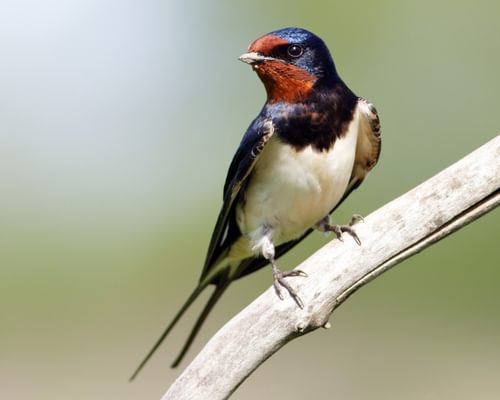Swallows are among nature's most accomplished aerial hunters, capturing the majority of their prey while in continuous flight.
These agile birds have evolved specialised feeding strategies that make them incredibly efficient at catching insects high above the ground or skimming just inches above water surfaces.
The Aerial Hunting Strategy
Swallows have adapted perfectly to their hunting style, with streamlined bodies and long, pointed wings that enable quick, precise movements in pursuit of flying insects.
Their short, broad beaks open wide to create an effective catching net, while bristles around their mouths help funnel prey into their throats during high-speed pursuits.
Most remarkably, swallows can process visual information about rapidly moving prey three times faster than humans, allowing them to track and intercept insects with extraordinary precision.

Swallow feeding juvenile
Primary Diet Components
Insects form the cornerstone of a swallow's diet, with studies showing that a single barn swallow can consume up to 850 insects per day. The specific breakdown typically includes:
Flying insects make up approximately 85% of their diet, with the following being particularly important:
- Flies (both small and large species)
- Beetles, especially during their flying phases
- Flying ants during seasonal emergences
- Airborne aphids
- Moths and butterflies
- Wasps and flying termites
Mosquitoes and gnats are particularly significant food sources, especially during dawn and dusk when these insects are most active. Research has shown that a colony of barn swallows can consume over 60 million insects during a single breeding season.

Swallows are acrobatic in flight
Seasonal Adaptations
Swallows demonstrate remarkable adaptability in their feeding patterns across seasons.
During spring and summer, they typically feed at higher altitudes where warmer air currents carry larger insects. In contrast, before and during rainfall, they often fly much lower, sometimes just feet above the ground or water, as changing air pressure forces insects to fly at lower altitudes.
Weather significantly influences their feeding behaviour. On cold days, when insects are less active at higher altitudes, swallows may feed just above vegetation, where prey remains more abundant. A single swallow family can cover up to 115 square miles during daily feeding activities.

Swallow with captured insect
Feeding Young
Parent swallows collect insects in their throats, forming small food balls that can contain hundreds of compressed insects bound together with saliva.
These food balls, typically weighing between 0.1 and 0.4 grams, provide concentrated nutrition to growing chicks. During peak feeding periods, parent birds may deliver food to their nestlings up to 400 times per day.

Barn Swallow feeding baby swallows (chicks)
Water Consumption
Unlike many other birds that need to land to drink, swallows can drink on the wing, skimming the water's surface with their lower beak while maintaining flight.
This adaptation allows them to remain airborne for extended periods, maximising their hunting efficiency. During hot weather, a swallow may drink up to 25 times per hour while continuing to hunt.

Swallow drinking water from a lake
Environmental Impact
The feeding habits of swallows play a crucial role in natural pest control. A single colony of 50 pairs can consume over 1.5 million flying insects in a breeding season.
This natural pest control service is particularly valuable in agricultural areas, where swallows help manage insect populations that could otherwise damage crops.

